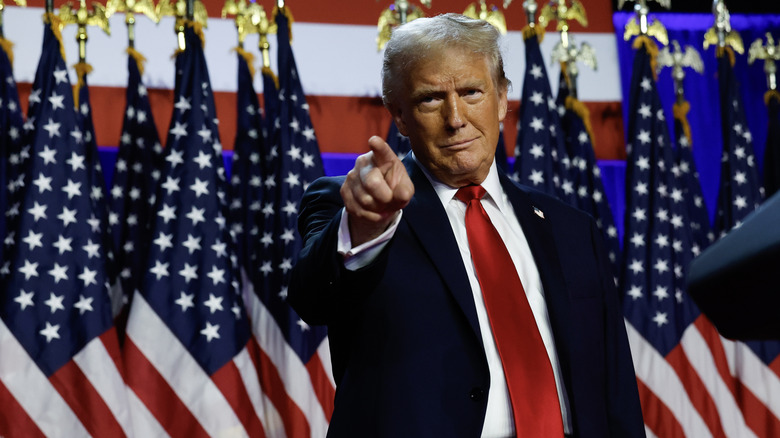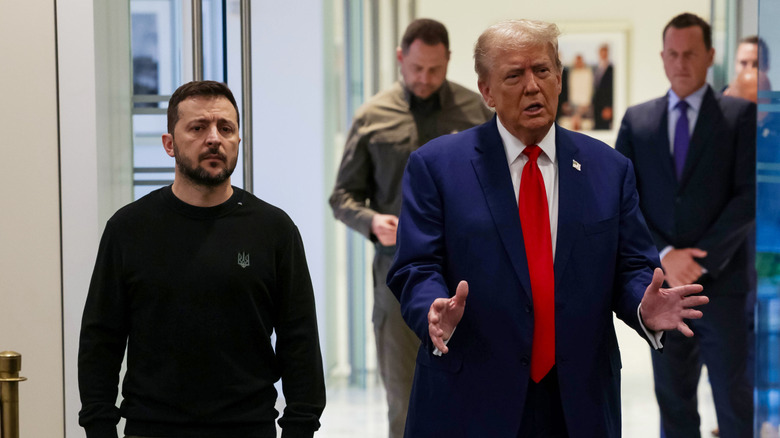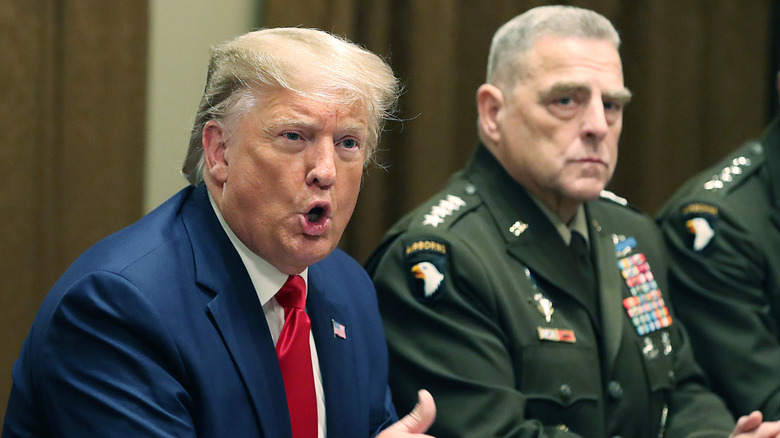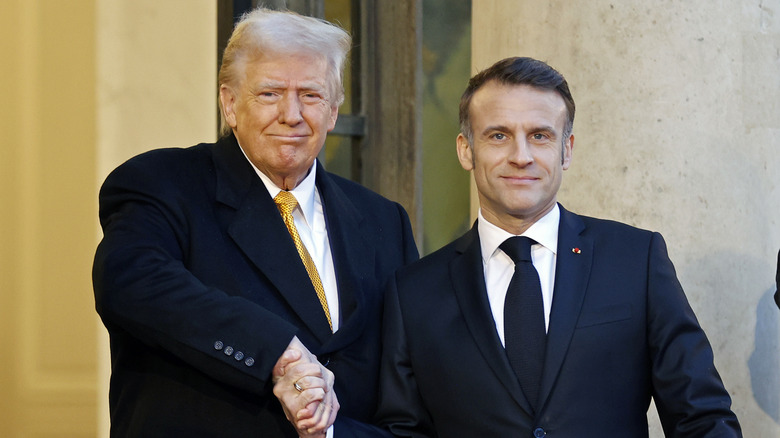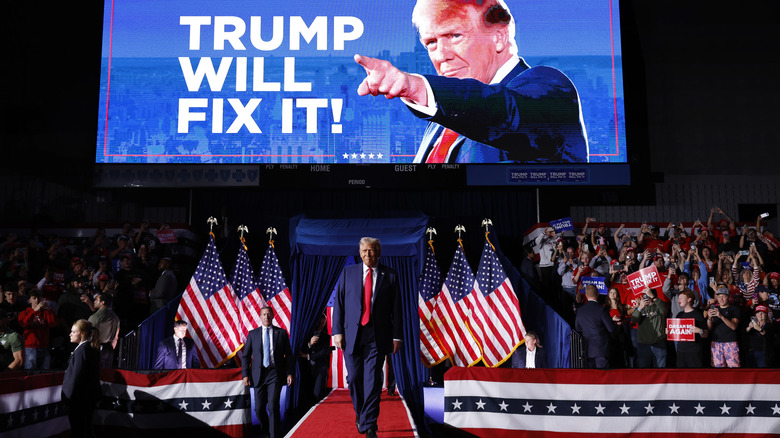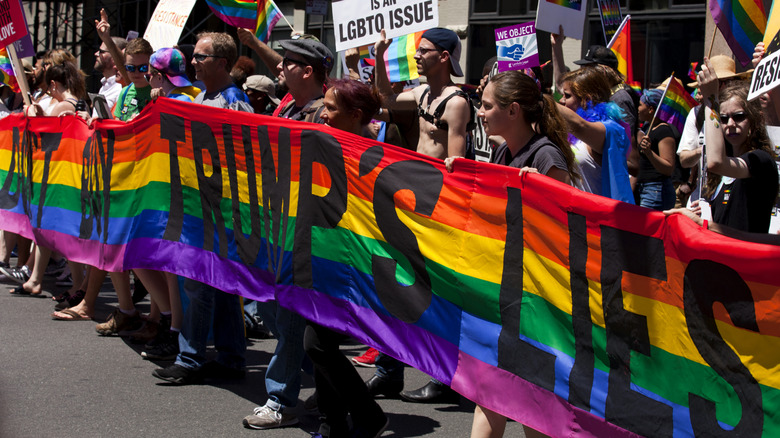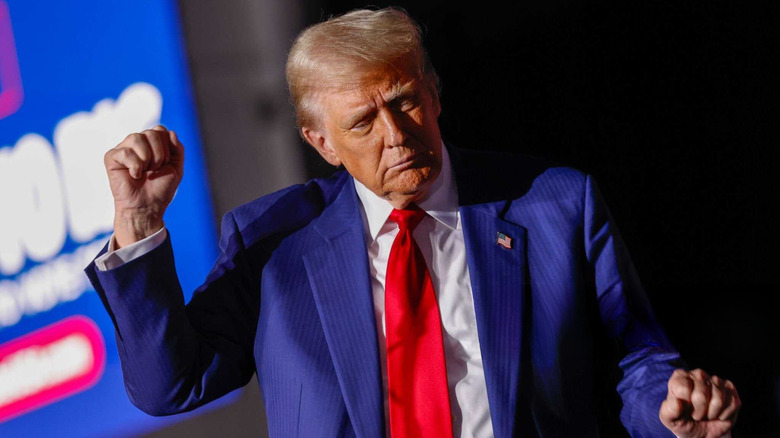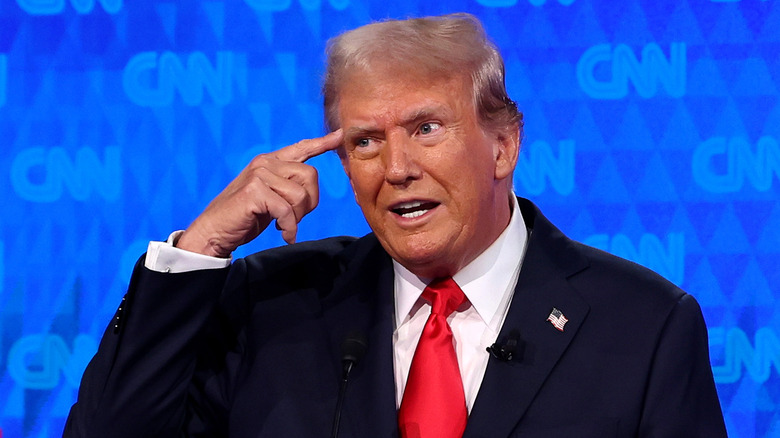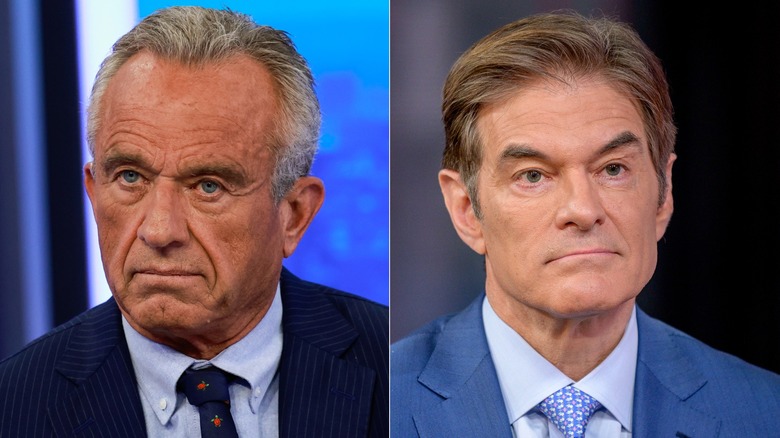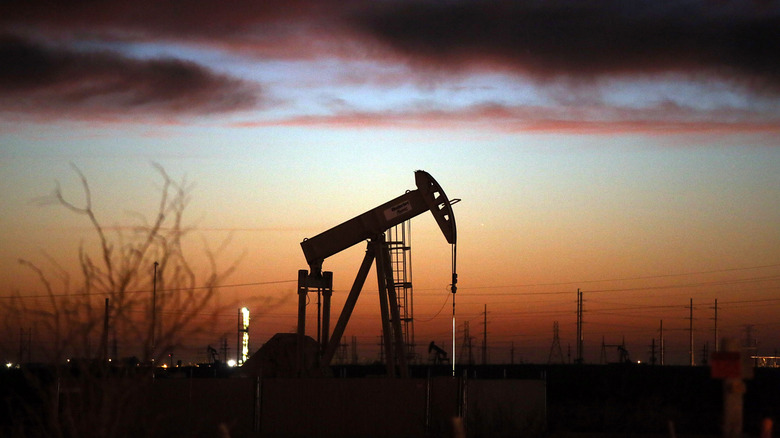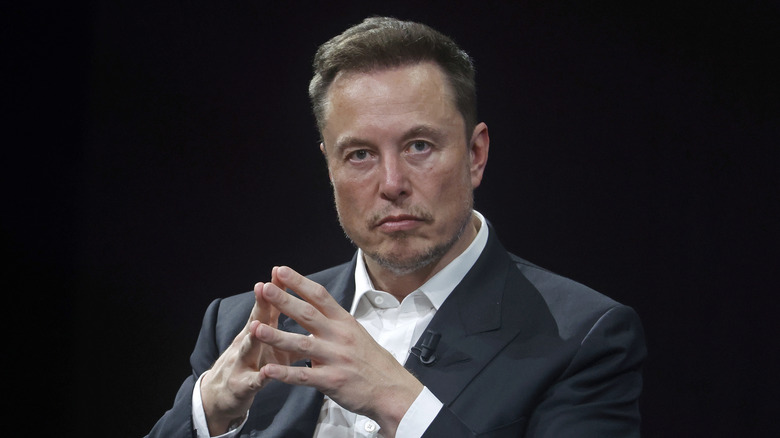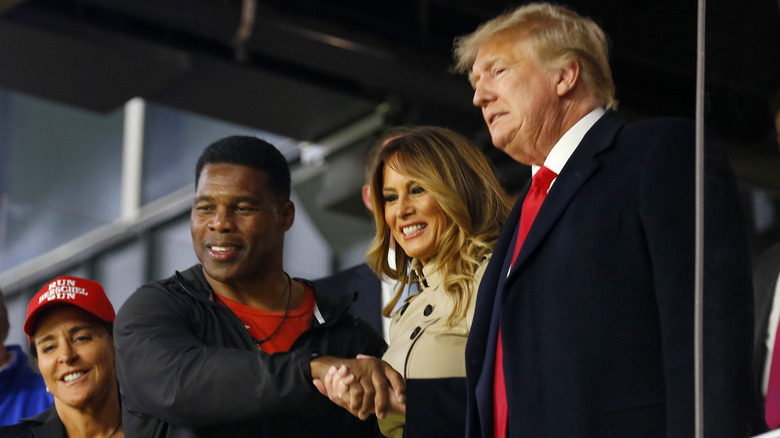Big Changes Donald Trump's Presidency Could Bring In 2025
We may receive a commission on purchases made from links.
Given how divided America has become, many were either appalled or thrilled about Donald Trump's return to the White House after winning the 2024 presidential election. Meanwhile, Trump wasted no time when it came to floating cabinet picks for his administration, stirring up plenty of controversy with his choices. His suggested choice for attorney general, embattled congressman Matt Gaetz, was immediately shot down over allegations of sex trafficking. Then there was Trump's pick for secretary of defense, Fox News personality Pete Hegseth, who also became embroiled in controversy when reports emerged that he'd paid off a woman who had accused him of sexual assault. Or how about QAnon adherent Kash Patel for director of the FBI? Patel's thirst to eradicate the "deep state" has been reflected in the children's books he wrote, namely the "Plot Against the King" series, in which nefarious forces conspire to take down "King Donald."
And that's just the tip of the iceberg; if the missives detailed in the controversial manifesto that is Project 2025 are enacted, the U.S. federal government may well become unlike anything ever seen before. With America about to cross the political Rubicon, what actually ends up taking place remains anybody's guess. But there are a variety of things that may well take place, based on declarations Trump has made. Here's a rundown of big changes that Donald Trump's presidency could bring in 2025.
Trump has promised to end the Ukraine war within one day
When Russian leader Vladimir Putin sent Russian troops into neighboring Ukraine, what was initially described as a "special military operation" spiraled into a full-blown invasion. As of late 2024, the war continues to have no end in sight: Ukraine has reported 43,000 casualties and more than 400,000 wounded, while losses on the Russian side have been estimated at nearly 200,000, with more than a half-million wounded.
During a speech at the Conservative Political Action Conference in March 2023, Trump made a big promise. "Before I even arrive at the Oval Office, I will have the disastrous war between Russia and Ukraine settled," he declared. "I will get the problem solved, and I will get it solved in rapid order — and it will take me no longer than one day." In May 2024, Trump insisted he'd be able to end the hostilities immediately. "I will prevent — and very easily — World War III, and very easily."
Upon meeting with the president-elect after the election, Ukraine's president, Volodymyr Zelensky, wouldn't confirm Trump's 24-hour timeline, but did express his belief that having Trump in the Oval Office would shorten the war. "It is certain that the war will end sooner with the policies of the team that will now lead the White House," he said, as reported by BBC News.
The firing and arrest of top military personnel
During his first presidential term, Donald Trump often referred to top military brass as "my generals." After he failed to win re-election in 2020, however, some of those generals shared their not-at-all-positive impressions of Trump. In his book, "A Sacred Oath," Trump's first-term secretary of defense, Mark Esper, claimed that Trump sought court-martials for retired military leaders Stanley McChrystal and William H. McRaven, both Trump critics.
Trump has also slammed General Mark Milley, outgoing chairman of the Joint Chiefs of Staff. In a Truth Social post, he implied Milley's handling of the withdrawal from Afghanistan was a "treasonous act" punishable by execution. Milley, on the flip side, characterized Trump as "fascist to the core" and "the most dangerous person in the country" when interviewed by journalist Bob Woodward (via The Washington Post).
In November 2024, a source told Reuters that plans were in place for mass firings throughout the U.S. military, including sacking all members of the Joint Chiefs of Staff and any appointees made by Milley. A subsequent report from NBC News claimed that a member of Trump's transition team, Matt Flynn, was mulling over creating a commission to investigate the Afghanistan exit, possibly resulting in military leaders being arrested and hit with charges — which could even include treason. Flynn's attorney, however, denied all. "Matt Flynn has nothing to do with the Trump transition team, much less leading any review concerning military justice matters," said the lawyer, Mark S. Zaid.
A potential exit from NATO
During his first term, Donald Trump repeatedly griped about America carrying the lion's share of the load in NATO, accusing Canada and Europe of not living up to their financial obligations. In fact, he threatened to pull the country out of the military alliance on more than one occasion. "I don't give a s*** about NATO," Trump reportedly once said, according to "The Room Where It Happened," the book written by former national security adviser John Bolton (as reported by Foreign Policy).
Trump himself was posed the question when he appeared on "Meet the Press" in December 2024, asked by journalist Kristen Welker whether he'd maintain America's position in the alliance. "If they pay their bills, absolutely," he said, but continued to gripe that America was being cheated. "But NATO's taking advantage of us," he added, claiming that his first-term tough talk accomplished his goal. "I said to the countries, 'I'm not going to protect you unless you pay,' and they started paying ... If they're paying their bills, and if I think they're doing a fair — they're treating us fairly, the answer is absolutely I'd stay with NATO."
But if he started to feel otherwise, would he pull out? "Absolutely," Trump declared. "Yeah, absolutely."
More expensive consumer goods (plus inflation and higher interest rates) due to increased import tariffs
Donald Trump has consistently promised to slam huge tariffs on countries such as China, Canada, and Mexico. According to Trump, those tariffs were partly in retaliation for those countries allegedly flooding America with deadly fentanyl. "Every damn thing that they sell into the United States is going to have like a 25% [tariff] until they stop drugs from coming in," he said during a campaign rally, as reported by Reuters. "And let me tell you something, those drugs will stop so damn fast that your head will spin."
The theory underlying Trump's tariffs is that by making imported products prohibitively expensive, consumers will buy American-made products instead, harming foreign firms while enriching American companies. The catch, however, is inflation could be reignited, causing interest rates to rise. "Most of us feel the tariff proposals are detrimental to the economy as a whole, even though they may benefit certain types of manufacturing at least for a time," Gary Schlossberg, global strategist for Wells Fargo Investment Institute, told USA Today.
Also opposing Trump's tariffs were 16 Nobel Prize-winning economists, who signed an open letter insisting that Trump's economic policies were likely to create deep damage that would take years, possibly even decades, to repair. "We believe that a second Trump term would have a negative impact on the U.S.'s economic standing in the world and a destabilizing effect on the U.S.'s domestic economy," the economists concluded.
Further hostility toward the LGBTQ community
It's no secret that the Republican party as a whole has not expressed a whole lot of fondness for the queer community, and there are many who are bracing for a second Trump administration to walk back decades of progress made in LGBTQ rights. That was particularly true of transgender people; Trump's campaign reportedly spent an estimated $21 million on anti-trans advertising. Trump also promised to reinstate a ban on transgender people serving in the military, and vowed to take other actions. "On day one, I will sign an executive order instructing every federal agency to cease the promotion of sex or gender transition at any age. They're not going to do it anymore," Trump said during a 2023 appearance at a Moms for Liberty event.
In the wake of Trump's 2024 election, numerous same-sex couples were rushing to the altar prior to Trump's inauguration over fears that gay marriage might be outlawed. Meanwhile, The Guardian pointed out another interconnected phenomenon by reporting that LGBTQ people have started increasingly arming themselves. According to Tom Nguyen, whose gun club, LA Progressive Shooters, is aimed at LGBTQ and people of color, he's been busier than ever since the election as rising numbers of LGBTQ people now fear they'll become targets, and have come to him seeking to learn how to use firearms. "It's been massively overwhelming," Nguyen said.
Trump has promised to dismantle the Department of Education
Another goal that Donald Trump has expressed for his second term as president involves the Department of Education, the federal organization established in 1979. Accusing the department of "indoctrinating young people with inappropriate racial, sexual, and political material" in a campaign video, Trump promised that he would abolish the entire department.
Despite that claim, he recommended that former WWE executive Linda McMahon become the department's chairman. So why would Trump tap somebody to run a department that he supposedly wants to eliminate? The reason, explained Michigan State University professor Joshua Cowen in an interview with CBS News, is that Trump's promise to dismantle the department won't be a cakewalk. "It's going to be hard," he said, pointing out that the Senate needs a 60-vote majority to pass a bill that would eliminate the department. In addition to that, he added, "They [politicians] realize some of the things that the education department oversees and funds are popular."
Meanwhile, American Federation of Teachers president Randi Weingarten told Local News Live she was open to working with McMahon if she's confirmed. "We're curious," she said. "We want to see what she's going to say in her confirmation hearings, but we're going to work with anybody we can work with to help kids succeed."
The mass deportation of up to 20 million migrants
Throughout his 2024 presidential campaign, Donald Trump has expressed outrage over illegal immigration into the U.S. "We're a dumping ground. We're like a garbage can for the world. That's what's happened," Trump said in a pre-election campaign rally (via CNN), and when interviewed by Time, he referenced between 15 million and 20 million migrants that he said shouldn't be in the country. "Twenty million people, many of them from jails, many of them from prisons," Trump said.
During his campaign rally in Madison Square Garden, he laid out his plan. "On day one, I will launch the largest deportation program in American history to get the criminals out," he said (via ABC News). As for how he plans to deport so many people, Trump claimed he'd be utilizing the services of local law enforcement, possibly even enlisting the National Guard.
However, there could be some dire unintended consequences of removing all those undocumented migrants, many of whom work seasonally in agriculture. "If you took away my workforce, you wouldn't eat," Manuel Cunha Jr., president of the Nisei Farmers League," told ABC News. "The country will stop, literally stop because the food system won't move."
Replacing the Affordable Care Act with 'concepts of a plan'
Donald Trump promised repeatedly during his first presidential term that he was going to "repeal and replace" the Affordable Care Act, more commonly known as Obamacare. Those efforts were unsuccessful during his first term as president, and a solid alternative was never presented.
When debating his opponent, Vice President Kamala Harris, Trump continued to trash his predecessor's healthcare. "Obamacare was lousy healthcare, always was, it's not very good today," he said. "We're going to do it and we're going to replace it." After he outlined vague details of his intentions, moderator Linsey Davis asked, "So just a yes or no, you still do not have a plan?" Trump replied, "I have concepts of a plan. I'm not president right now." He doubled down on that when asked the same question during an interview with NBC News. "Yes, we have concepts of a plan that would be better."
While that plan, as of December 2024, remains conceptual, a number of changes may be looming on the horizon. These could include changes to Medicare that would privatize insurance coverage, and some sweeping (and as-yet-unspecified) changes to reproductive rights for women.
Reimagining American healthcare with vaccine skeptic RFK Jr. and controversial celebrity doctor Mehmet Oz
While it remains an open question if and when Obamacare will be repealed and replaced, Donald Trump's choices to run America's federal healthcare agencies certainly hinted at some sweeping changes. Enter controversy magnet Robert F. Kennedy Jr. as the nominee for secretary of the Department of Health and Human Services, and Dr. Mehmet Oz as the proposed administrator of Centers for Medicare and Medicaid Services.
Kennedy's background is in environmental law, not medicine, and he's made headlines for his anti-vaccine stance and his vow to remove fluoride from drinking water. As James Hodge, public health law expert at Arizona State University's Sandra Day O'Connor College of Law, told NPR, Kennedy's position on vaccines could lead to new epidemics of diseases that science had long beaten, ranging from whooping cough to measles to polio. "The litany of things that will start to topple is profound," said Hodge. "We're going to experience a seminal change in vaccine law and policy."
Then there's Dr. Oz, described by Hafiz Rashid in The New Republic as "a quack TV doctor." Oz ran for a Pennsylvania Senate seat that ultimately went to John Fetterman. "Prior to all of that, Oz was best known for peddling 'miracle' medical cures and quack diet solutions on daytime television ..." Rashid wrote. "With Oz and Robert F. Kennedy Jr., a noted anti-vaxxer and medical conspiracist, both taking on healthcare leadership positions in Trump's administration, the next four years may lead to extensive damage to American public health."
An increase in oil drilling and a decrease in combating climate change
While campaigning, Trump promised that once he returned to the White House, the oil and gas industry would be given free rein to "drill, baby, drill." In fact, plans did indeed emerge indicating that Trump's team was working on a wide-ranging energy package, which would boost offshore oil drilling and allow oil companies to drill on federal land.
While that's great news for oil companies, what does a second Trump term look like when it comes to climate change? "The result from this election will be seen as a major blow to global climate action," Christiana Figueres, former UN climate chief, told BBC News.
Meanwhile, much can be gleaned from the public statements of the people that Trump is placing in charge. Elise Stefanik, his appointee as ambassador to the United Nations, has stated, "Americans have had enough of Joe Biden and far-left Democrats' anti-American energy policies." In addition, while Robert F. Kennedy Jr. has expressed his belief that climate change is happening, he's also stated (via The New York Times) that "this crisis is being used as a pretext for clamping down totalitarian controls."
Massive downsizing of the federal workforce (courtesy of Elon Musk)
One of the first things that Donald Trump did upon being elected America's 47th president was to install Tesla/SpaceX billionaire Elon Musk as head of a newly created advisory board, the Department of Government Efficiency. Assisting Musk to run DOGE, as it's being called (any similarity to Musk's Dogecoin cryptocurrency is seemingly intentional), is former Republican presidential candidate Vivek Ramaswamy.
"It will become, potentially, 'The Manhattan Project' of our time," Trump wrote in a statement. While that WWII-era mission harnessed the power of the atom for warfare, Musk and Ramaswamy's aim is to eliminate waste from the federal government. In a piece that Musk and Ramaswamy wrote for the Wall Street Journal, they insisted their roles were as "outside volunteers, not federal officials or employees," while declaring that government bureaucracy "represents an existential threat to our republic." They also promised to take immediate action. "Unlike government commissions or advisory committees, we won't just write reports or cut ribbons," they wrote. "We'll cut costs."
While it remains to be seen what will be cut, the duo has set a goal of trimming $500 billion from the U.S. government's budget. Targets so far appear to include the Corporation for Public Broadcasting, currently the recipient of $535 million per year in government funding, as well as $1.5 billion worth of international funding, and Planned Parenthood, which receives close to $300 million each year.
A new missile defense shield — with former NFL star Hershel Walker in charge
During his 2024 presidential campaign, Donald Trump frequently promised to build an "Iron Dome" missile defense shield, similar to the system used by Israel. During one campaign rally, reported The Hill, Trump vowed to "build a missile defense shield all made in the USA" and "put Herschel Walker in charge of that little sucker." Walker, of course, is a failed Senate candidate who is better known for his 12 seasons playing in the NFL than for his experience as a military strategist.
Meanwhile, critics of the plan have not only pointed out the ridiculous price tag, but that it would also prove ineffective in protecting the U.S. from long-range missiles from Russia or North Korea. According to Jeffrey Lewis, a missile expert at the Middlebury's James Martin Center for Nonproliferation Studies, Trump's plan for an "Iron Dome" is simply not serious. "The Iron Dome here has just become a kind of brand name, like Xerox or Kleenex for missile defense," he told Mother Jones. "It's dramatically unclear to me what any of this means," Lewis said of the Iron Dome idea, "other than just treating it like the insane ramblings of a senile old person."
